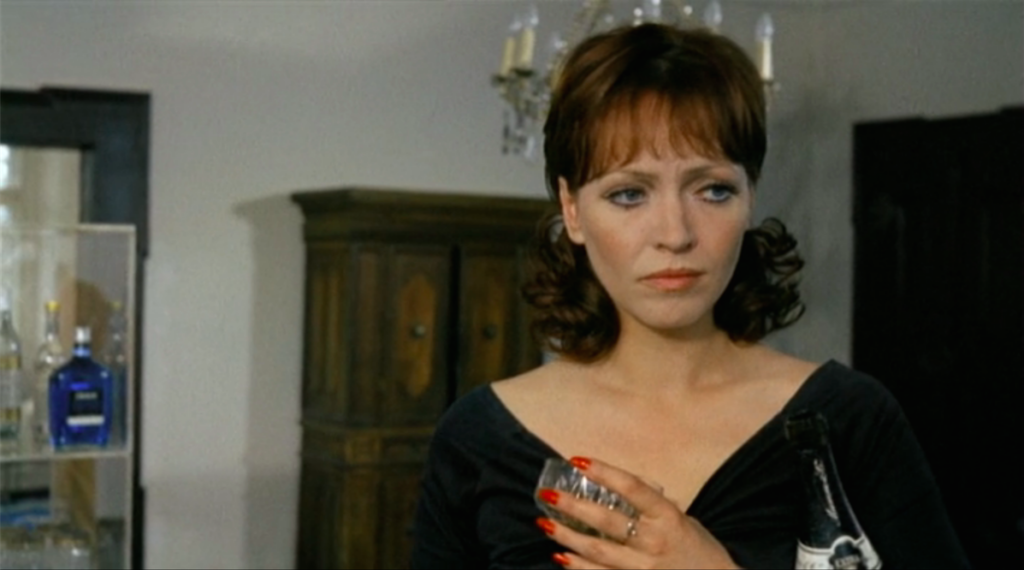
Chinesisches Roulette (1976) is Rainer Werner Fassbinder’s macabre marriage farce. It’s a film of cold spaces occupied by unloving individuals caught in a series of maneuvers attempting to gain the adoration and approval of those around them. At the time, Chinesisches Roulette was Fassbinder’s biggest production. It heralded his arrival as an important filmmaker on the international stage.
Rather than conjuring some monumental spectacle Fassbinder opted for the kammerspiele. In true Brechtian fashion Fassbinder choreographs every shot meticulously so that each image broadcasts its subtext as loudly as Peer Raben’s score while simultaneously indicating the inherent artificiality of the image itself. The technical operations of Chinesisches Roulette are as methodical and uncaring as the gestures and actions of its cast of characters.
Chinesisches Roulette presents society in microcosm; the rules and standards of which are manipulated by the players in this psychodrama for their own gain. Imbuing the portrait of a family in turmoil with these political themes becomes, on a personal level, reflexive of Fassbinder’s own unorthodox experience with family. Chinesisches Roulette is a painful catharsis just as much as it is a grim reflection of our world. The abstract constructs that give the world meaning are weaponized in Chinesisches Roulette and rendered in the robotic gestures of the actors and the expressionistic camera moves of Michael Ballhaus.
The title, Chinesisches Roulette (Chinese Roulette), comes from the party game that serves as the climax of Fassbinder’s film. The participants split into two teams of equal number and must ask questions which the opposing team answers that serve as clues as to which participant is being discussed. It’s a truth telling game that reveals as much about the individual players as it does the chosen participant.
The game is suggested by Angela (Andrea Schober), a young girl whose legs were disabled by an unknown illness, on a weekend visit to her family’s country estate where she and her caretaker, Traunitz (Macha Méril), have happened upon her parents (Margit Carstensen and Alexander Allerson) with their lovers (Anna Karina and Ulli Lommel). From the beginning the narrative of Chinesisches Roulette has functioned as a kind of game of truth telling with revelation after revelation happening in quick succession. Not even the servants (Brigitte Mira and Volker Spengler) are immune to the inevitability of truth.
Truth itself, on a conceptual level, is equated with death. Each time a secret is outed a kind of death of personality occurs. Fassbinder reiterates this with the text at the close of Chinesisches Roulette which is lifted from the Holy vows of matrimony. In Chinesisches Roulette the expression “Till death do us part” could literally be interpreted as “Till truth do us part”.
The theatricality of Fassbinder’s Brechtian aesthetic is itself concerned with performance. In the narrative context of Chinesisches Roulette these performances are almost entirely social, functioning as figurative masks worn by the characters that disguise their true nature and the true roles they are meant to play. This notion, in turn, reconnects to Fassbinder’s desire to present society in microcosm.
One of Fassbinder’s signature strategies as a filmmaker was to, roughly half way through a film, disrupt the tone of the picture with a seemingly bizarre music cue. This is an idea derived from Brecht’s work with Kurt Weill but given a post-modern edge via Fassbinder’s choice of music. The Miklós Rózsa-esque score of Peer Raben is interrupted by Kraftwerk’s Radioactivity in a scene where Traunitz dances about wildly for Angela’s entertainment. This abrupt tonal variance suggests the volatility to come as much as it creates a break from the ever escalating tension.
Chinesisches Roulette is one of Fassbinder’s most formally mature works from the period in his career when he looked to Douglas Sirk rather than Jean-Luc Godard and the French New Wave for aesthetic guidance. It’s ironic then that Anna Karina should appear in Chinesisches Roulette rather than one of Fassbinder’s earlier films like Die Niklashauser Fart (1970). However Karina is still given the glamorous treatment by Fassbinder whose adoration for the star lies just beneath the surface of every image he’s captured of her.
